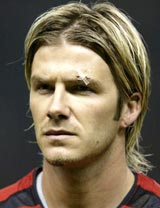In December 1986 Alex Ferguson was just a few weeks into his new job as manager of Manchester United while David Beckham was a nervous 11-year-old about to perform in front of a packed Old Trafford for the first time.
Neither the soccer-worldly Scot nor the skinny London schoolboy who won the Bobby Charlton Soccer Skills competition could have had the slightest notion of what they would go on to achieve together over the next 17 years.
"Despite what people say about me and Sir Alex Ferguson, he's been a father figure for me," Beckham said this week, shortly before United announced they were prepared to sell their prized asset to Barcelona.
"Without him I wouldn't be the player or the person that I am today, because he had the confidence when I was 18 years old to put me in the first team."
Beckham signed a schoolboy contract with the country's biggest club on his 14th birthday. In those days United ran their youth team with almost Victorian values. The teenage hopefuls -- now multi-millionaire internationals -- were farmed out to local homes where a trusted landlady would act as surrogate mother and gatekeeper.
Ferguson and the stars of the United first team were a long way from the terraced houses surrounding the homely Cliff training ground in Salford -- now replaced by a state-of-the-art complex 10 miles out of the city with security like a prison.
But Beckham, part of United's 1992 FA Youth Cup-winning team, was always going to make it to the big time.
As a 17-year-old in 1993, he joined the trainee ranks a few months before Ferguson and United ended their 26-year-wait for the league title.
 By the 1995-96 season he was a regular in the team that had begun its dominance of the English game that continues to this day.
By the 1995-96 season he was a regular in the team that had begun its dominance of the English game that continues to this day.
For years his relationship with Ferguson was ideal -- the smiling young superstar, also an England regular, arm in arm with his wise old manager as yet another piece of silverware was paraded round the ever-expanding Old Trafford.
Ferguson offered unconditional support through Beckham's lowest moment -- the red card in England's 1998 World Cup defeat against Argentina -- and the player did not forget it as he signed a five-year contract to show his loyalty to the club.
But as Beckham's relationship with pop star Victoria Adams flourished, that with Ferguson began to show the first signs of wear.
For the former shipbuilding apprentice from the tough streets of Glasgow, Beckham's forays into the world of fashion, pop, and celebrity lifestyle were an unwelcome and frankly unfathomable distraction.
Beckham was fined for attending a party ahead of a Champions League game in 1999 and the following year Ferguson dropped him after a blazing row when he missed training. Beckham later said it was because his son Brooklyn was ill.
Bookmakers at the time began offering short odds that he would move on, but things settled down as Ferguson seemed to accept that one of his most important players on the pitch was also becoming something of an icon off it.
The sarong, tattoos, haircuts, fashion shows, and endorsements no doubt rankled, but Beckham was also covering new ground on the pitch as he developed into a proud and inspirational England captain.
He also signed a new four-year contract with United in 2002 which made him one of the highest-paid players in the world.
But the two cultures reached boiling point midway through last season with the infamous flying boot affair. Beckham's face, as much as his feet, had become his fortune and he and his image-conscious wife did not enjoy having it stitched after a furious Ferguson let fly after the team's FA Cup defeat by Arsenal.
By then, keeping his brooding midfielder on the bench for a series of high-profile games, Ferguson reminded everyone just who was boss at United.
Successive failures in the Champions League have left the manager desperately searching for a new approach and his silence on the transfer issue this week speaks volumes about where Beckham fits in his plans.
It was a long and generally happy marriage, but it now seems one that has suffered an irreconcilable breakdown.








 © 2025
© 2025